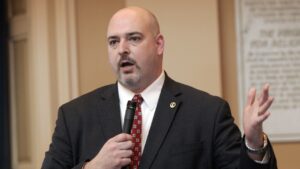
Todd Gilbert, Speaker of the House of Delegates
by Dick Hall-Sizemore
Probably the single most important factor contributing to the power of the Speaker of the Virginia House of Delegates is the authority, under the Rules of the House, to assign members to committees. The committees to which a member is assigned can often determine the degree of influence he wields in the House. Also, from a public policy perspective, the composition of a committee often determines the fate of legislation.
There are a lot of factors at play in doling out committee assignments. They include (not necessarily in this order of importance): party distribution, regional balance, members’ preferences, members’ backgrounds and expertise, seniority, and personal factors (whether the member impressed or crossed the Speaker, for example).
Every two years there is a jockeying for assignments and some shuffling. Some committees are considered more prestigious than others. Among the most desired appointments are Appropriations, Finance, Courts of Justice, and Commerce and Energy. As members gain seniority, many angle for assignment to one of these, although a few favored freshmen occasionally get one of the coveted assignments. One general expectation is that returning members get to retain their prior committee assignments, if they want them. But that is not always the case. After all, the Speaker has the last word.
Changes in committees are largely “inside baseball” stuff, of interest primarily to lobbyists and other hangers-on around Capitol Square. However, some aspects can be revealing about how legislative sessions will play out, or sometimes pose a tantalizing mystery. Speaker Todd Gilbert has produced such a mystery, at least to those of us on the outside.
Not only does the Speaker assign members to committees, he also designates the chair or vice-chair of each committee. Generally, the chair is the member with the longest length of service on the committee and who does not chair another committee. But not always. The Speaker rules.
In a surprising move, Gilbert named Roxann Robinson of Chesterfield to chair the Finance Committee, which handles all tax legislation. It was a surprise because, first, Lee Ware of Powhatan County has chaired Finance since 2014, except for the 2020 and 2021 sessions, when Democrats were in the majority. He was generally the delegate who spoke for Republicans on tax issues. (He is still on the Finance Committee and was named chairman of the Agriculture, Chesapeake and Natural Resources Committee, one of the “lesser” committees.)
The second reason her designation was a surprise is that she has never served on the Finance Committee. Although she is a fairly senior member, having been in the General Assembly since the 2011 Session, she was never appointed to a major committee until 2018, when she landed a spot on the Appropriations Committee, on which she served for two years.
I cannot remember an instance in which a newcomer to a committee was named the chair, much less ahead of a long-time member of the committee who had chaired it for several previous sessions. I am not going to hazard a guess as to the reasons for this appointment because anything I might say would be speculation (and unfounded speculation, at that). Perhaps Steve Haner, who follows tax bills and likely still has some insight into the politics of the Republican caucus, can shed some light for us.
Another interesting move by Gilbert was displacing Terry Kilgore as chair of the Commerce and Energy Committee and installing Kathy Byron of Lynchburg as chair. Kilgore has been the biggest Republican champion of Dominion Energy and, from his position as chair of this key committee, has helped push legislation Dominion favored and kill bills that Dominion did not like. I hope Steve also has some thoughts about the ramifications of this change in the chairmanship of this committee.
As for the partisan makeup of the committees, Gilbert maintained a 12-10 Republican majority on each committee, which is as fair as it can get. When the party majority changes, there is sometimes a tendency for the new majority party to kick strong members of the opposing party off major committees. With a couple of exceptions, Gilbert kept the returning Democratic members of Appropriations, Finance, Courts of Justice, and Commerce and Energy on those committees.
It seems that Gilbert did indulge in a bit of understandable payback. When the Democrats took over in 2020, the new Speaker, Eileen Filler-Corn (Fairfax) deprived Gilbert of his long-held membership on Courts of Justice and put him on Agriculture, Chesapeake and Natural Resources. Before Filler-Corn became Speaker, her committee assignments had included Commerce and Labor and Finance, two major committees. Now that she is back on the floor as a regular member, she has been assigned to Agriculture, Chesapeake and Natural Resources and Education, two lesser sought-after committees. (She did retain her membership on the Rules Committee, which would be expected for the minority party leader.)
Side note: I do wish they would stop changing the names of committees. For eons, the House committee that handled business-related bills was called the Corporations, Insurance and Banking Committee. There was a minor committee called Labor and Commerce. In 2002 the two were combined into Commerce and Labor. In 2020, the Democrats, perhaps in a reflection of priorities, changed the committee name to Labor and Commerce. Now, the committee’s name is Commerce and Energy. I do not know what happened to “Labor”.. I leave it to others to speculate if that says anything about Republican priorities.


